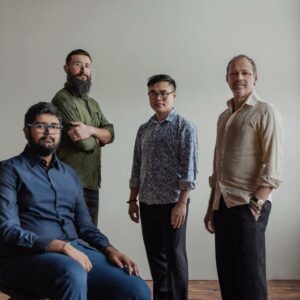Incantations
Sirius Quartet
Fung Chern Hwei violin
Gregor Huebner violin
Sunjay Jayaram viola
Jeremy Harman cello
The Sirius Quartet speaks past the veil in INCANTATIONS, a collection of nine works honoring memory, grief, and the aspect of loss as it appears in our interpersonal and social relationships. The music of INCANTATIONS is a speaking vessel to concentrate the profound loss experienced at the individual and communal level in recent decades into a great beyond, a release of grief for its composers, performers, and listeners alike. Exploring grief as it exists in political, cultural, and familial spaces, the Sirius Quartet commentates on the loss of loved ones as eloquently as it commentates on the loss of shared humanity in the great American political divide, or the devastating loss afflicted by unnecessary war. Pulling from various cultural diasporas, INCANTATIONS teaches a lesson in the universal language of loss, and the unique and beautiful ways we respond and adapt to it.
Listen
Stream/Buy
Choose your platform

Experience in Immersive Audio
This album is available in spatial audio on compatible devices.
Stream now on Apple Music, Tidal, and Amazon Music.
Track Listing & Credits
| # | Title | Composer | Performer | |
|---|---|---|---|---|
| 01 | Echo Chambers | Jeremy Harman | Sirius Quartet | 7:33 |
| 02 | Sahasranamam | Sunjay Jayaram | Sirius Quartet | 6:12 |
| 03 | Chant pour l'ile Gorée | Gregor Huebner | Sirius Quartet | 8:35 |
| 04 | String Quartet Nr. 7 Op. 76 - Rage: I. Shut It Down | Gregor Huebner | Sirius Quartet | 3:38 |
| 05 | String Quartet Nr. 7 Op. 76 - Rage: II. Magutny Bozha (for the people of Belarus) | Gregor Huebner | Sirius Quartet | 3:37 |
| 06 | String Quartet Nr. 7 Op. 76 - Rage: III. Aleppo | Gregor Huebner | Sirius Quartet | 8:53 |
| 07 | Between Impulses | Fung Chern Hwei | Sirius Quartet | 7:35 |
| 08 | You Can't Get Them Back | Sunjay Jayaram | Sirius Quartet | 8:08 |
| 09 | Farwell, Horatio | Fung Chern Hwei | Sirius Quartet | 8:07 |
| 10 | At Sea (Scatter the Ashes) | Jeremy Harman | Sirius Quartet | 7:00 |
| 11 | Prayer of Mind and Heart | Anonymous | Sirius Quartet | 4:18 |
Recorded at Kyberg Studios in Oberhaching, Germany
Recording & Mixing Kseniya Kawko
Mastering Christoph Stickel at CS Mastering in Vienna, Austria
Track 7
Recorded at the Bunker Studios in Brooklyn NY
Studio Engineer Nolan Thies
Executive Producer Bob Lord
VP of A&R Brandon MacNeil
VP of Production Jan Košulič
Audio Director Lucas Paquette
VP, Design & Marketing Brett Picknell
Art Director Ryan Harrison
Design Edward A. Fleming
Publicity Chelsea Kornago
Digital Marketing Manager Brett Iannucci
Artist Information

Sirius Quartet
Sirius Quartet combines exhilarating repertoire with unequaled improvisational fire. These conservatory-trained performer-composers shine with precision, soul and raw energy, championing a forward-thinking, genre-defying approach. Since their debut concert at the original Knitting Factory in New York City, Sirius has played some of the most important venues in the world, including Carnegie Hall, Lincoln Center’s Alice Tully Hall, the Beijing Music Festival, the Cologne Music Triennale, the Beethoven-Haus Bonn, Stuttgart Jazz, Musique Actuelle in Canada, the Taichung Jazz Fest — Taiwan’s biggest jazz event — and many others.

Fung Chern Hwei
One of the most sought after violinists in New York City, Malaysian-born Fung Chern Hwei absorbed a large number of musical styles growing up in a diverse environment. Artists that he has been fortunate enough to perform with include Hiromi, Uri Caine, Rufus Reid, Steve Wilson, Richie Beirach, Terence Blanchard, and the Turtle Island Quartet, among others. In addition to Sirius Quartet, Fung can also be found performing and recording with metal string quartet SEVEN)SUNS and Michael Bates’ Acrobat, a chamber jazz band that performs music from Soviet composers.

Gregor Huebner
Gregor Huebner is a GRAMMY®-nominated and award-winning composer and violinist, celebrated by audiences and critics alike for his visionary work across genres. His music has been described by The New York City Jazz Record as “challenging and vivid… seamlessly incorporat[ing] chamber elements with avant garde jazz.” Born in Stuttgart, Huebner splits his time between New York and Munich. As a member of Sirius Quartet, Richie Beirach/Gregor Huebner Duo, El Violin Latino, Berta Epple, and founder of the Munich Composers Collective, he has performed at festivals including the Montreux Jazz Festival (Switzerland), Cork Festival (Ireland), Taichung Jazz Festival (Taiwan), Tbilisi Jazz Festival (Georgia), and the Bell Atlantic Festival in New York.

Sunjay Jayaram
Sunjay Jayaram is a violist, violinist, and improviser who enjoys playing in a wide variety of styles including traditional and contemporary classical music as well as jazz, Carnatic music, and more. He is the violist in Sirius Quartet, a progressive chamber group that composes and performs its own music. He has worked with a wide variety of groups and ensembles in New York City such as the American Composers Orchestra, 8-Bit Big Band, Ene, and the chamber orchestra Parlando. Jayaram has also worked with musicians and directors including Ted Sperling, Bobby Sanabria, Huang Ruo, Elijah Thomas, Richie Beirach, Amir ElSaffar, and others. Find Jayaram on Instagram.

Jeremy Harman
Massachusetts-based cellist, composer, and songwriter Jeremy Harman is always exploring shifting musical terrain with a continual desire to evolve as both an artist and a person. Equally at home on acoustic and electric instruments, Harman embodies the “post-genre” attitude in his broad-based love of music and insatiable curiosity to explore it through the lens of the cello. Whether playing string quartets, jazz standards, freely improvised creations, or hardcore and metal riffs, Harman’s musical voice is as impassioned as it is distinct.
Notes
Those we remember never fully disappear from our lives. As artists, we are gifted with the power to speak to the realm of our ancestors. With this new album, we each call out to those who came before us. The pieces on this record are our Incantations, through which we speak into the beyond. What we offer to the beyond, we offer to you, the listener, so that we may not forget great people in the ever-flowing river of spirits.

